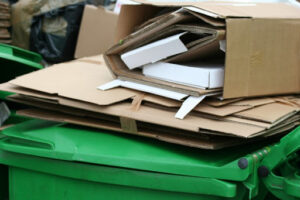At home, whether or not you recycle is your choice. There probably won’t be any consequences if you don’t wash and recycle your plastic containers. But business leaders have to look at every decision through multiple lenses to determine what is the most beneficial in the long run. Even things that may seem minor, like how your business recycles, can have a ripple effect that affects your future success. Taking a proactive and thoughtful approach to business recycling accomplishes several important goals in support of your business’s ongoing success in addition to keeping confidential materials secure.
What Business Recycling Accomplishes
 First and most importantly, proper business recycling is about protecting your confidential materials. Your workplace is filled with devices that have the ability to store sensitive data about your business as well as your clients and employees. As you know, that data doesn’t just disappear when you’re done with those devices. Properly disposing of data-storing devices keeps that data from being accessed by outsiders. Because those devices are made primarily from reusable materials, they have to be handled by professionals who can both destroy the hard drives and recycle any recovered material.
First and most importantly, proper business recycling is about protecting your confidential materials. Your workplace is filled with devices that have the ability to store sensitive data about your business as well as your clients and employees. As you know, that data doesn’t just disappear when you’re done with those devices. Properly disposing of data-storing devices keeps that data from being accessed by outsiders. Because those devices are made primarily from reusable materials, they have to be handled by professionals who can both destroy the hard drives and recycle any recovered material.
Business recycling can also be about protecting confidential information relating to proprietary products and designs. If you’re disposing of any materials that you wouldn’t want your competition or resellers to access, you need to make sure that they’re recycled rather than sent to a landfill where they could be recovered and possibly even resold.
In addition to protecting your confidential materials, recycling brings value to your business in a few other ways. You may generate some extra cash by selling your scrap metal, old electronics and other valuable materials to recyclers. Plus, taking a systematic approach to business recycling may help you win favor with current and prospective clients and employees. Recycling and sustainability are hot topics that a lot of people are passionate about. When clients or job candidates who care strongly about recycling visit your offices, maintaining an obviously recycling-friendly workplace is just one more selling point for your business.
Business Recycling Best Practices
Your business can’t meet its recycling goals without participation from your employees. With an efficient system in place, it’s just as easy for employees to recycle as it would be for them to throw recoverable materials away.
Have a data protection policy that addresses recycling.
Every business should have its own data protection policy, laying out all the ways in which the organization protects its confidential data. Creating such a policy and training employees to follow it is an important part of preventing breaches and keeping your confidential material confidential. A data protection policy generally covers issues like systems access, password requirements and reporting procedures if a breach happens. It can also be used to create guidelines for disposing of confidential materials. Make sure your policy is clear about what kinds of materials your business recycles and shreds, and that employees know where to put confidential materials that need to be destroyed.
Responsibly recycle computers and other devices.
When your business upgrades its computers or disposes of other obsolete electronics, what happens to those old devices? Not all recycling methods are equally secure. Donating old computers or handing them off to an electronics recycling program in your area is too risky. You can’t know where those devices will end up or whether you can trust the people who might handle them. All obsolete devices that have the potential to store confidential material should be handled by an established electronics recycler that can dismantle and destroy the hard drives, then process the recyclable material. You may even be able to arrange to witness the destruction of your hard drives.
Shred some papers, recycle others.
While it’s great to be diligent about shredding confidential files, your business probably doesn’t need to pay your shredding service to destroy every piece of paper that passes through your office. You need one system to collect confidential papers for your shredding service, and another system for collecting paper and cardboard that doesn’t need to be shredded. For some businesses, it makes sense to bring in recycling equipment like balers to manage cardboard and other textiles.
Use locked storage containers until pickup. Just because confidential materials are stored on your premises doesn’t mean they’re secure. There may be a lot of people moving through your business in the course of a normal day, and you probably don’t know or trust them all. Work with your recycling vendor to bring in locked containers for storing obsolete devices and other confidential recyclable materials in between pickups.
Schedule a recycling walk-through. Your expertise is with your business, not with recycling. It’s possible that there are holes in your business recycling system that could improve your ROI or help you run your business more efficiently. Bring your recycling vendor onsite for an assessment of your current systems and equipment to make sure you’re not missing anything.
Miller Recycling meets a wide range of business recycling needs for our clients. We’re here to help you make recycling as lucrative and secure as possible. How can we help your business streamline its recycling systems? Contact us today!

